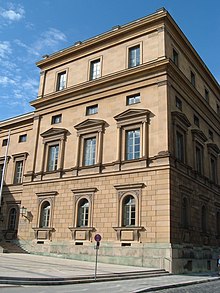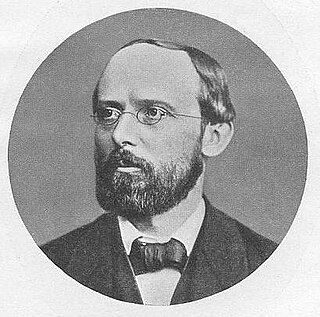
Wilhelm von Christ was a German classical scholar.

The Royal Prussian Academy of Sciences was an academy established in Berlin, Germany on 11 July 1700, four years after the Prussian Academy of Arts, or "Arts Academy," to which "Berlin Academy" may also refer. In the 18th century, it was a French-language institution since French was the language of science and culture during that era.

Haimhausen is a municipality located on the Amper River in the district of Dachau in Bavaria, Germany, about 20 kilometres north of Munich.

The Göttingen Academy of Sciences is the oldest continuously existing institution among the eight scientific academies in Germany, which are united under the umbrella of the Union of German Academies of Sciences and Humanities. It has the task of promoting research under its own auspices and in collaboration with academics in and outside Germany. It has its seat in the university town of Göttingen. Its meeting room is located in the auditorium of the University of Göttingen.
Friedrich Jürgen Baethgen was a German historian born in Greifswald. He specialized in medieval studies and in history of the papacy.

The Bavarian Maximilian Order for Science and Art was first established on 28 November 1853 by King Maximilian II von Bayern. It is awarded to acknowledge and reward excellent and outstanding achievements in the field of science and art. From 1933 onwards the order was no longer awarded, until 1980 when it was reinstated by the then Minister-President of the Free State of Bavaria Franz Josef Strauß. Munich jewellers Hemmerle have been responsible for making the medal since 1905.

Johann Georg von Lori was a Bavarian high official, lawyer and historian. He was the driving force behind the foundation of the Bavarian Academy of Sciences and Humanities in 1759.
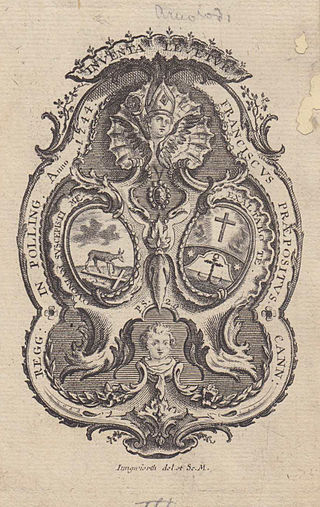
Franz Töpsl was an Augustinian Canon Regular, provost of Polling Abbey, historian and librarian.

Sigmund Graf von Haimhausen was a Bavarian aristocrat, mining operator, head of the Bavarian Mint and Mines commission, porcelain manufacturer and first president of the Bavarian Academy of Sciences.
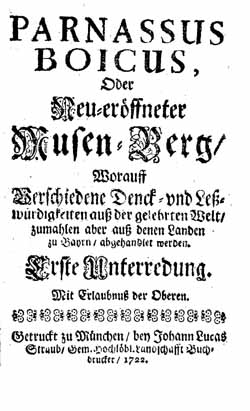
The Parnassus Boicus was a Bavarian learned society founded in 1722, and the name of a journal published by the society.
Friedrich Wilhelm Karl Ritter von Hegel was a German historian and son of the philosopher Georg Wilhelm Friedrich Hegel. During his lifetime he was a well-known and well-reputed historian who received many awards and honours. He was one of the major urban historians during the second half of the 19th century.

The Historische Lexikon Bayerns or Historical Lexicon of Bavaria is a specialist, historical lexicon about the History of Bavaria, which has been published as a genuine online publication. It is the first specialised lexicon on the history of the Free State of Bavaria and its various regions.
Gustav Conrad Bauer was a German mathematician, known for the Bauer-Muir transformation and Bauer's conic sections. He earned a footnote in the history of science as the doctoral advisor (Doktorvater) of Heinrich Burkhardt, who became one of the two referees of Albert Einstein's doctoral dissertation.
Dieter Nörr was a German scholar of Ancient Law. He studied at the Ludwig Maximilian University of Munich from 1949 to 1953. After receiving his doctorate with a dissertation on criminal law in the Code of Hammurabi, Nörr undertook postdoctoral study at the University of Heidelberg and the University of Rome. He worked for a year as a post-doctoral assistant at the Institute for Criminal Law and Legal Philosophy under Karl Engisch. He received his Habilitation at the University of Munich, under Professor Wolfgang Kunkel, in 1959 with a work on Byzantine Contract Law and was promoted to Privatdozent. He then accepted the Chair of Roman and Civil Law at the University of Hamburg. In 1960, Nörr became Full Professor at the University of Münster. After he declined positions at the Universities of Hamburg, Tübingen, and Bielefeld, he returned to the Ludwig Maximilian University of Munich as Professor, Chair of Roman Law, and Director of the Leopold Wenger Institute for Ancient Legal History and Papyrus Research. His brother, Knut Wolfgang Nörr, was also a Professor of Legal History, especially Canon Law, at the University of Tübingen.

Johanna Narten, was a German Indo-Europeanist and Indo-Iranian linguist who discovered the reconstructed morphological category in Proto-Indo-European now known as the Narten present. She was Professor of Indo-European and Indo-Iranian Linguistics at Friedrich-Alexander-Universität Erlangen-Nürnberg and a member of the Bayerische Akademie der Wissenschaften.
Hubert Kaufhold is a German legal scholar and judge, with special research interests in the languages and legal history of the Christian Orient.
Gerrit Walther is a German historian.
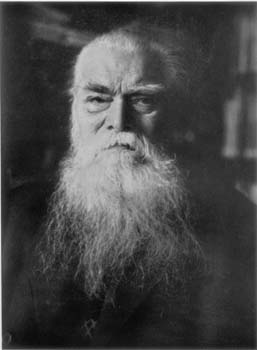
Karl Konrad Ferdinand Maria von Amira was a German jurist who served as Professor of Constitutional Law at the Ludwig Maximilian University of Munich. He was a known expert on early Germanic law.
The Institute of Bavarian History at the Ludwig Maximilian University (Ludwig-Maximilians-Universität) in Munich is a centre of research and teaching of Bavarian history in a European context. It is located in the building complex of the Bavarian State Archives and in the immediate vicinity of the Bavarian State Library.
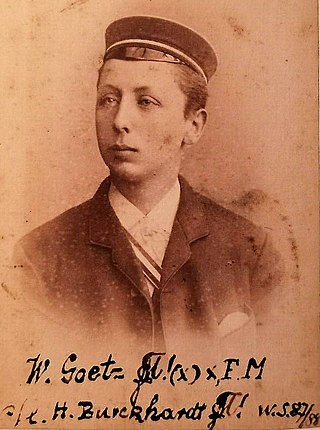
Walter Goetz was a German historian, primarily of Europe during the sixteenth century. During the years of the German republic he embarked on a parallel career in politics, serving as a member of the Reichstag (parliament) between 1920 and 1928, and representing the centre-left DDP (party).
